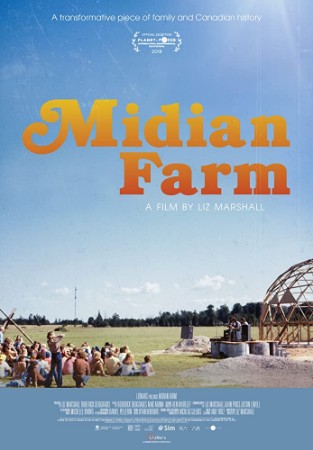
Midian Farm 2018
Distributed by Collective Eye Films, 1315 SE 20th Ave. #3, Portland OR 97214; 971-236-2056
Produced by Liz Marshall and Rod Deogrades
Directed by Liz Marshall
Streaming, 80 mins
College - General Adult
Communal Living; Religion and Spirituality; Sociology
Date Entered: 07/15/2020
Reviewed by Megan Wilson, Science and Agriculture Librarian, Murray State UniversityLiz Marshall’s esoteric documentary Midian Farm documents the filmmaker’s attempt to “detangle family history” and take a look at her parent's 1970 alternative lifestyle community in Beaverton, Ontario.
The film starts out strong with evocative images of the now-abandoned dome structure on the Property that was Midian Farm. From there Marshall provides a history of Midian Farm through interviews with former members of the Farm and archival footage. The first segment of the documentary is primarily concerned with the farm origins. The narrative focuses on interviewing her parents and the other co-owners with an emphasis on the reasoning behind the establishment of the farm, including how it evolved from Christian youth efforts run out of the parents' home.
Unfortunately, the personal nature of the project causes the narrative to break down once the interviews turn to the farm itself. The fact that all the interviewees know the interviewer on a personal level lends itself to a meandering and nostalgic form of storytelling that leaves out details that are already known to the participants. The experience of watching this film could be likened to going to a friend’s family reunion, the interviewees provide interesting tidbits of information about life at Midian Farm interspersed with tangents about this person’s romantic interest or that person’s mother. The interview style also means that it is often unclear how each speaker’s experience fits into the overarching narrative.
The other main concern is that in contrast to the detail on the farm’s background, the fall of the farm is largely glossed over. Though there is a mention of a series of disasters cited as the main cause (hail, lightning, flood, fire), no timeline of these events is given. Other details, including the separation of the filmmaker's parents, claims of authoritarianism, and remarks that the group “started to feel culty” are mentioned but not examined in any detail.
Marshall's film would benefit greatly by providing a clearer continuity and context for the events mentioned. For example, the film ends with a reunion of the farm’s former inhabitants. Due to its position at the end of the film, it feels very tacked on. This present-day view of the farm's inhabitants would have served the narrative better had it been used at the beginning of the film allowing the scene to provide greater context about the individuals involved. Additionally, with the exception of a few opening shots, the footage throughout seems amateur, with the cameraperson often seeming to be unable to decide what to focus on. The sound quality also suffers, with an odd echo appearing anytime the interviewer speaks.
As a historical documentary, Midian Farm is marred by esoteric storytelling, shaky camera work, and poor sound quality. Midian Farm provides an interesting perspective on the so-called hippie movement and lifestyle communities but the esoteric nature of the narrative as well as the lack of detail in the dissolution of the farm means this documentary has limited academic value. The steep price point and limited usage lead to a verdict of Not Recommended.